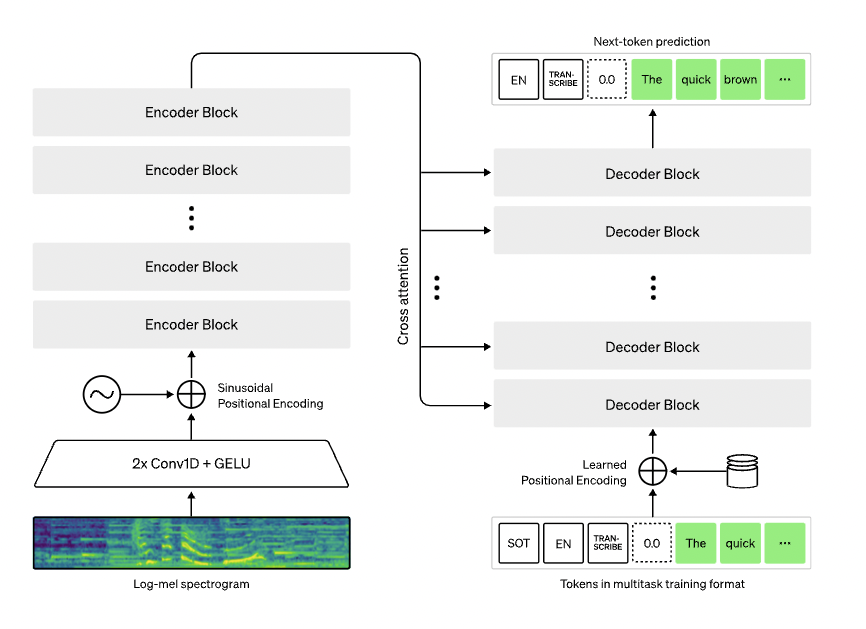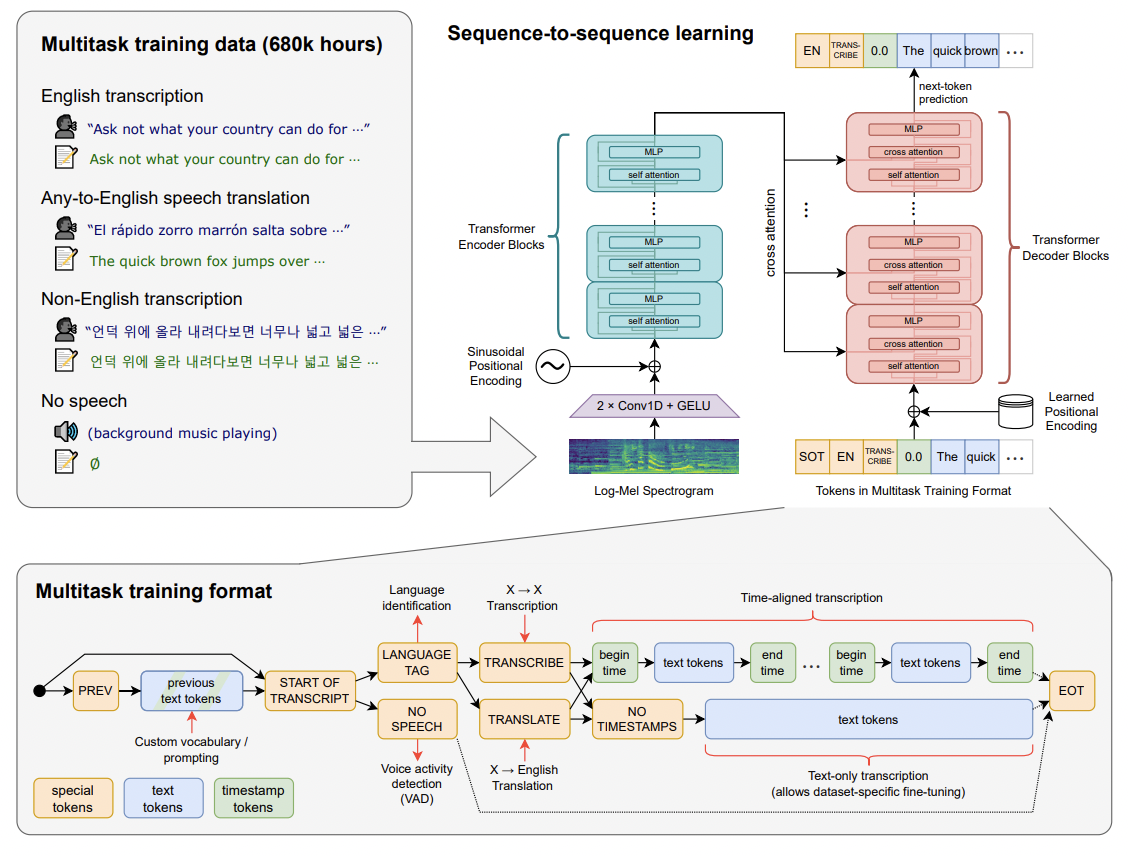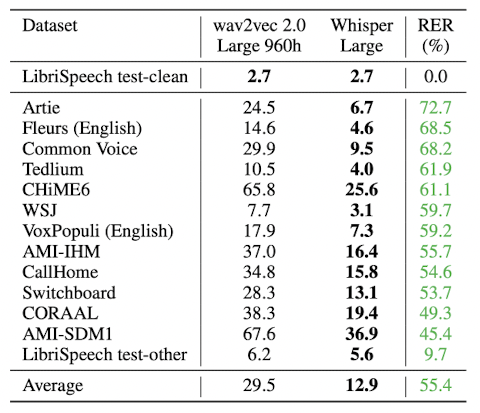Whisper
Introduction
- Whisper is an open source multi-task audio model released by OpenAI. It is an ASR system that works on 97 different languages (including english) and can even perform translation from other languages to english.
- The model was trained on 680,000 hours of multilingual and multitask data collected from the web. Whisper was trained using large scale weak supervision.
- Here is an interesting perspective for weak supervision training,
- There are 3 types of data and training strategies - (1) golden standard data for supervised training, (2) silver standard data for weakly supervised training, and (3) unlabelled data for unsupervised training.
- Now, it is difficult to get golden dataset due to human involvement which is costly and time consuming. And model trained on unlabelled datatset with unsupervised strategy lead to mediocre decoder part that needs further finetuning for downstream tasks.
- This gives the silver standard dataset a huge advantage, as it is the middle ground with large size and high accuracy.
Note
As huge portion of silver standard dataset might have had no humans verfication, there is always a room for faulty data. Hence the name - weak supervision.
Dataset
- Author scraped the internet to collect huge and diverse transcription dataset. As this may also introduce noise, extra care was taken in pre-processing step to clean the data.
- The intention was to only consider human annotated data, for this any audio-text pair that "seems" like machine generated was removed. For this, they removed normalised transcriptions (only upper case, only lower case, lack of punctuations, etc) as they are most likely machine generated (no human writes like that). They even trained language detection models to make sure that there is no mis-match in the audio and text pair's language. Finally, de-duplication was also done.
- With this, overall 680,000 hours was dataset was collected. The breakdown is as follows,
- 117,000 hours of non-english 96 different language data.
- 125,000 hours of X-->en translation data.
- 438,000 hours of english transcription data.
- Every audio files was resampled at 16,000 Hz and broken in 30 secs chunks to be passed to model for training. Transcription were also broken in the same chunk size respectively.
Note
The training dataset was not released by OpenAI. But they have open sourced the code and the pretrained models. Evaluation dataset details are shared here
Architecture
- Authors picked the Transformer model as it has been widely used since its inception in 2017 and it scales reliably. The audio chunk is first converted into 80-channel log-magnitude Mel spectrogram with 25ms window and stride of 10ms. The features are scaled between -1 and 1 with zero mean across the dataset.

- The input is first passed to two convolution layers with a filter width of 3 and GELU activation function. Sinusoidal position embeddings are added to the output and it is then passed to the encoder block of Transformer. The decoder block uses learned positional embedding and uses multiple cross-attention layers to apply encoder output. BPE text tokenizer was used like GPT-2.
- The decoder utilises multiple special tokens to facilitate the multi-task output generation. They are,
<|startoftranscript|>to denote start of prediction<|nospeech|>to denote silence or even non-spoken voices (ex: background noise and music)<|transcribe|>to denote 'transcription' task<|translation|>to denote 'translation' task<|notimestamps|>to denote absence of timestamps<|endoftranscript|>to denote end of prediction

Results
- The performance of whisper model is very good. On comparing with
wav2vec2 large 960hmodel,whisper largemodels makes 55% less errors on average. This is huge! In fact in some cases, even the tiny model performs better than older large models!

Warning
Claims on bad performance of Whisper was made in this Twitter thread. Here, Ryan Hileman compared Whisper with NVIDIA and Talon model on several datasets to find Talon performing well against Whisper models. Also, he noted that Whisper models are quite slow in execution (even the tiny model). Finally, he provided samples for "catastrophic failures" of Whisper of following types -- (1) generating complete paragraphs for single word audio input (like dec, car, two, snake, other), (2) hallucinations and repetition in the output.
Anyone thinking of using Whisper for their project should consider these concerns and test them out themselves before deployment.
Released Models
- Authors released 5 variety of models based on size, going from 39M param tiny model to 1550M param large model. For each there are is an english only model
{size}.en(ex:tiny.en) and a multilingual model{size}(ex:tiny).
| Size | Parameters | English-only model | Multilingual model | Required VRAM | Relative speed |
|---|---|---|---|---|---|
| tiny | 39 M | tiny.en |
tiny |
~1 GB | ~32x |
| base | 74 M | base.en |
base |
~1 GB | ~16x |
| small | 244 M | small.en |
small |
~2 GB | ~6x |
| medium | 769 M | medium.en |
medium |
~5 GB | ~2x |
| large | 1550 M | N/A | large |
~10 GB | 1x |
Code
- We will go through two ways to use Whisper model.
- Authors have released a Python package called
whisper[1] that makes using the pretrained models as easy as writing 3 lines of code. - OpenAI recently released the API for Whisper model [2] While it a paid service (~$0.36 for 1 hour of audio transcription), they take care of constantly improving the model and hosting complexities.
- Authors have released a Python package called
Python Package Inference
- Below is the inference code shared in the Readme of official Github repo [1],
1 2 3 4 5 6 7 8 9 10 11 12 13 14 15 16 17 18 | |
Note
Auto language detection only works if you don't specify it explicitly using language param in transcribe function. The package uses only the first 30 secs to detect the language.
Also, whisper's translation is not that accurate hence an alternative approach could be to perform transcription using Whisper but use another package to translate the transcription.
- The package also provides CLI support, here is an example,
whisper japanese.wav --language Japanese
# generates --
# txt file (transcription), and
# vtt file (segment wise transcription with timestamp)
- Finally for the brave souls, we can even play around with the individual modules and perform the transcription step by step, (from readme [1])
1 2 3 4 5 6 7 8 9 10 11 12 13 14 15 16 17 18 19 20 21 22 23 24 25 26 | |
OpenAI API
- Before we code, here are some important points to be aware of,
- OpenAI hosted Whisper model is recommended to be used for ~59 languages for which the WER rate is <50%, as for others the accuracy will not be good. Refer
- Whisper API only supports files that are less than 25 MB. For bigger files, we will have to split or used compressed audio.
- Finally, we can even use prompt engineering to further improve the accuracy of transcription. It can be used for word boosting, enforcing punctuations, styles and more. Refer
Note
Use of prompt engineering to enhance the transcription accuracy is a relatively newer approach and needs research for more clarity.
- With that out of the way, using OpenAI API for audio transcription using Whisper is quite easy as shown below, [1]
1 2 3 4 5 6 7 8 | |
Note
Apart from file and model, transcribe function supports multiple parameters like, (Refer API doc)
prompt: for prompt engineering (more details below)response_format: to change the transcription output. We can useverbose_jsonto get timestamp and logits details.temperature: to introduce randomness in generation (default is 0)language: language of input audio
- For translation you can directly use
1 2 3 4 5 6 7 8 | |
- Finally, we can use prompt engineering to enhance the accuracy by using
promptparam. Below are some examples,
1 2 3 4 5 6 7 8 9 | |